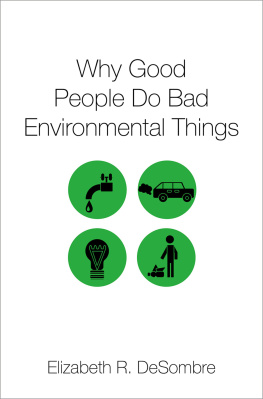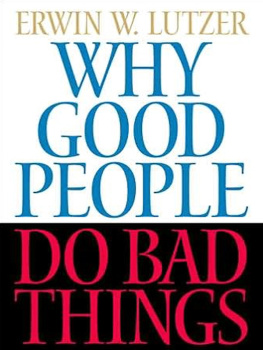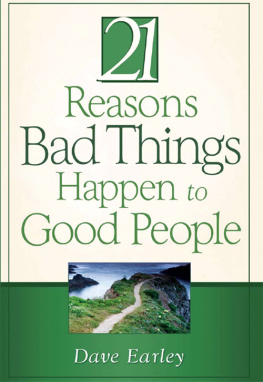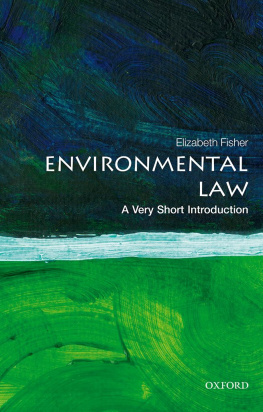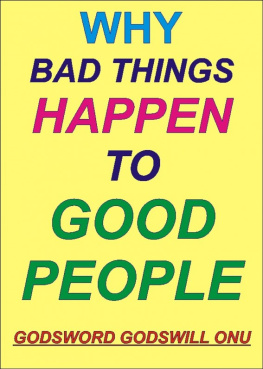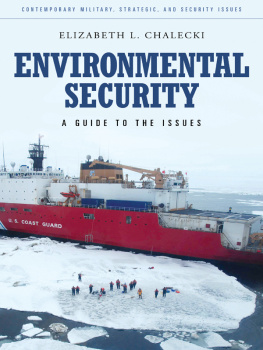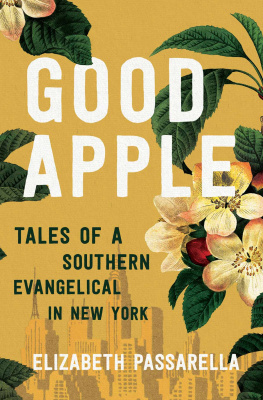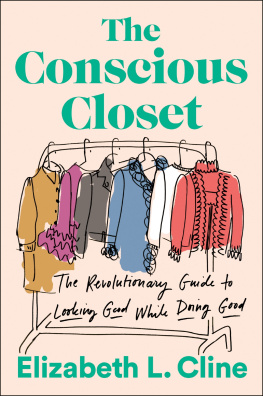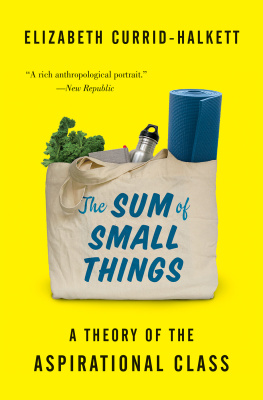Elizabeth R. DeSombre - Why Good People Do Bad Environmental Things
Here you can read online Elizabeth R. DeSombre - Why Good People Do Bad Environmental Things full text of the book (entire story) in english for free. Download pdf and epub, get meaning, cover and reviews about this ebook. year: 2018, publisher: Oxford University Press, genre: Politics. Description of the work, (preface) as well as reviews are available. Best literature library LitArk.com created for fans of good reading and offers a wide selection of genres:
Romance novel
Science fiction
Adventure
Detective
Science
History
Home and family
Prose
Art
Politics
Computer
Non-fiction
Religion
Business
Children
Humor
Choose a favorite category and find really read worthwhile books. Enjoy immersion in the world of imagination, feel the emotions of the characters or learn something new for yourself, make an fascinating discovery.
- Book:Why Good People Do Bad Environmental Things
- Author:
- Publisher:Oxford University Press
- Genre:
- Year:2018
- Rating:5 / 5
- Favourites:Add to favourites
- Your mark:
- 100
- 1
- 2
- 3
- 4
- 5
Why Good People Do Bad Environmental Things: summary, description and annotation
We offer to read an annotation, description, summary or preface (depends on what the author of the book "Why Good People Do Bad Environmental Things" wrote himself). If you haven't found the necessary information about the book — write in the comments, we will try to find it.
Why Good People Do Bad Environmental Things — read online for free the complete book (whole text) full work
Below is the text of the book, divided by pages. System saving the place of the last page read, allows you to conveniently read the book "Why Good People Do Bad Environmental Things" online for free, without having to search again every time where you left off. Put a bookmark, and you can go to the page where you finished reading at any time.
Font size:
Interval:
Bookmark:


Oxford University Press is a department of the University of Oxford. It furthers the Universitys objective of excellence in research, scholarship, and education by publishing worldwide. Oxford is a registered trade mark of Oxford University Press in the UK and certain other countries.
Published in the United States of America by Oxford University Press
198 Madison Avenue, New York, NY 10016, United States of America.
Oxford University Press 2018
All rights reserved. No part of this publication may be reproduced, stored in a retrieval system, or transmitted, in any form or by any means, without the prior permission in writing of Oxford University Press, or as expressly permitted by law, by license, or under terms agreed with the appropriate reproduction rights organization. Inquiries concerning reproduction outside the scope of the above should be sent to the Rights Department, Oxford University Press, at the address above.
You must not circulate this work in any other form and you must impose this same condition on any acquirer.
CIP data is on file at the Library of Congress
ISBN 9780190636272
eISBN 9780190636296
For Lynda.
See? It really is your book.
I arrived at this project by many paths, and completed it with the assistance of many people.
I am lucky enough to teach environmental studies at Wellesley College. About a decade ago when we reimagined our environmental studies curriculum, we decided that we should have a core course that looked at what social science tells us about why we get environmental problems and how to address them. The course I created to fill that niche (with the unwieldy name of Social Causes and Consequences of Environmental Problems) quickly became one of my favorite courses to teach. It forced me to move beyond my home discipline of political science to look across economics, psychology, sociology, and other approaches, to conceptualize the social causes of our individual and collective behavior. I have learned as much from my students as I have taught them; their research projects in the course illuminate the concepts weve worked with, and their questions prod me to a deeper understanding of the mechanisms we study.
Another of the paths toward this book was my service on the Sustainable Energy Committee in the town of Wellesley. At the beginning of my second year on the committee I was asked, as the academic in the group, to give a presentation on what scholarship tells us about how to change environmental behavior. I have never presented to a more receptive audience. For the remainder of the year at nearly every meeting someone would refer back to some insight they had taken from my presentation, and we used it to guide the policies we created to decrease the environmental impact of our town.
So many people have helped bring this book into existence. Many colleagues, friends, and students read (multiple!) drafts of the manuscript, helping me refine the arguments and improve the clarity of my writing. In particular, I am grateful to Thomas Heberlein, Craig Murphy, Ken Conca, Peter Jacques, Lynda Warwick, Angelina Li, Ali Saueressig, Jacqueline Floyd, and two anonymous reviewers for excellent feedback. Other students who did research that contributed to this project include Randelle Boots, Kate Corcoran, Alysha Cross, Meredith Wade, and Janna Zimmerman. Anani Galindo and Jess Hunter provided last-minute help with logistics, and Caroline George and Frances Dingivan helped with the index. Sammy Barkin read this book more times than anyone should have to, and offered useful suggestions throughout the process of writing and revising it. Zo, and her predecessor Sophie, reminded me to make long walks outside into a habitual part of my day.
I began the writing of this book while on a fellowship at the Newhouse Center for the Humanities at Wellesley College, a glorious place and community for academic thought. I am grateful to then-director Carol Dougherty, who took a chance inviting a social scientist into this community of humanists, and to my fellow Newhouse Center scholars who helped me figure out how to communicate these ideas to people without a social science background. And I have benefited throughout this process from support from Camilla Chandler Frost, Wellesley Class of 1947, who gave the donation to help create the Environmental Studies program at Wellesley and endow the chair I hold.
Maybe youre concerned about toxic pollution, like heavy metals and other hazardous materials from our increasing global use of electronics. At least forty million tons of electronics waste is discarded every year, and these wastes are often disposed of in the most vulnerable communities, contaminating soil and water and causing harm to human health. leading to soil erosion, land degradation, and the loss of irreplaceable biodiversity.
Why havent we taken serious action to prevent these problems? Perhaps people dont know how serious they are, or dont understand what they do in their daily lives that contribute to them. In my job as a college professor, and as a scholar of environmental issues, I frequently run into sincere people persuaded that all we need to do to fix environmental problems is to let people know that environmental problems are severe and that their behavior is causing ecological harm. Surely, the logic goes, if we educate people about the role their behavior plays in causing these problems, they will change what they are doing.
This framing runs into several problems. Many people know that they are doing things that cause environmental problems, and they do them anyway. Think about how you felt when you took a disposable bag at the grocery store or took a solo drive to get to that store rather than walking or taking public transportation. If you stopped to think about it, you knew not only that plastic waste and climate change were problems, but also what the better environmental choice would have been. And yet you frequently dont choose it.
There is little evidence (as my students frequently discover in the course of their efforts) that letting people know about environmental problems and their contributions to them changes behavior in meaningful ways. When you got into your car to drive to work this morning, would someone telling you that you were contributing to climate change have altered your decision? Many factors contributed to your commuting choice, including the time and cost to get where you were going, the existing transit routes and schedules, and the other things you had to do on your way to or from work. If your contribution to climate change even registered, it was one of many factors you were balancing in making your commuting decision.
Information about the dangers of environmental problems, and your contribution to creating them, may even backfire. People come to see themselves as powerless to address huge global problems, or dont want to think of themselves as the sort of people who would fail to act to prevent such problems. They may respond by pushing these issues out of their minds.
Or maybe the problem is that people just dont care enough. If you or your child grew up in the United States, you almost certainly encountered this environmental wisdom delivered by Dr. Seuss: Unless someone like you cares a whole awful lot, nothing is going to get better, its not.the environment. But levels of environmental concern are quite high worldwide, with people even expressing a willingness to sacrifice for the environment. If youre reading this, you must be concerned enough about the environment to have picked up a book on the topic; has that prevented you from making problematic environmental choices?
Font size:
Interval:
Bookmark:
Similar books «Why Good People Do Bad Environmental Things»
Look at similar books to Why Good People Do Bad Environmental Things. We have selected literature similar in name and meaning in the hope of providing readers with more options to find new, interesting, not yet read works.
Discussion, reviews of the book Why Good People Do Bad Environmental Things and just readers' own opinions. Leave your comments, write what you think about the work, its meaning or the main characters. Specify what exactly you liked and what you didn't like, and why you think so.

